2020年八年级上英语语法总结
- 格式:docx
- 大小:26.05 KB
- 文档页数:10
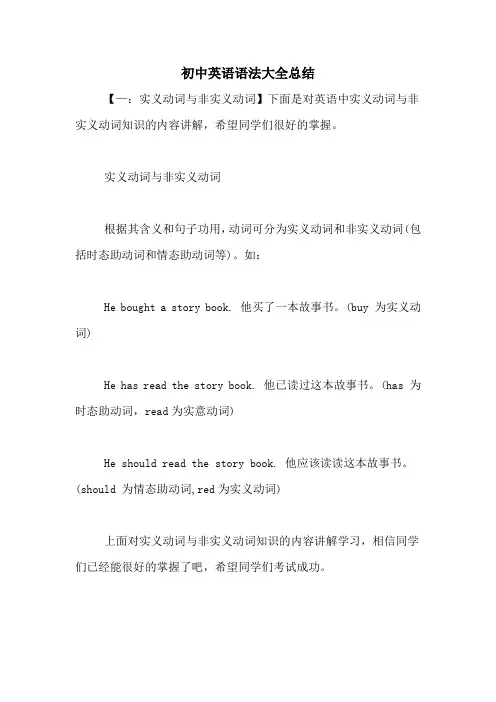
初中英语语法大全总结【—:实义动词与非实义动词】下面是对英语中实义动词与非实义动词知识的内容讲解,希望同学们很好的掌握。
实义动词与非实义动词根据其含义和句子功用,动词可分为实义动词和非实义动词(包括时态助动词和情态助动词等)。
如:He bought a story book. 他买了一本故事书。
(buy 为实义动词)He has read the story book. 他已读过这本故事书。
(has 为时态助动词,read为实意动词)He should read the story book. 他应该读读这本故事书。
(should 为情态助动词,red为实义动词)上面对实义动词与非实义动词知识的内容讲解学习,相信同学们已经能很好的掌握了吧,希望同学们考试成功。
【—辅导之构词法】关于构词法的英语语法知识,希望同学们认真学习。
构词法英语构词法主要有:合成法、派生法和转换法。
1、合成法:如:spaceship, headache, basketball, playground 等等。
2、派生法:(1)派生名词:①动词+er/or ②动词+ing ③动词+(t)ion ④形容词+ness ⑤其他,如:inventor, learner, swimming, congratulation, kindness, carelessness, knowledge(2)派生形容词:①名词+y ②名词+ful ③动词+ing/ed ④friendly ⑤dangerous ⑥Chinese; Japanese ⑦English ⑧French ⑨German ⑩国名+(i)an 如:snowy, sunny, hopeful, beautiful, interesting, follwing, daily(每日的),nervous, delicious(3)派生副词:①形容词+ly ②其它,如:slowly, angrily, full →fully, good→well, possible→possibly等等。
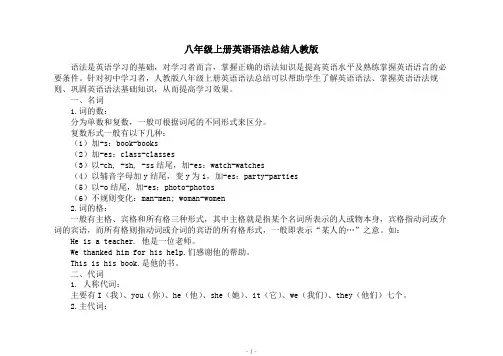
八年级上册英语语法总结人教版语法是英语学习的基础,对学习者而言,掌握正确的语法知识是提高英语水平及熟练掌握英语语言的必要条件。
针对初中学习者,人教版八年级上册英语语法总结可以帮助学生了解英语语法、掌握英语语法规则、巩固英语语法基础知识,从而提高学习效果。
一、名词1.词的数:分为单数和复数,一般可根据词尾的不同形式来区分。
复数形式一般有以下几种:(1)加-s:book-books(2)加-es:class-classes(3)以-ch, -sh, -ss结尾,加-es:watch-watches(4)以辅音字母加y结尾,变y为i,加-es:party-parties(5)以-o结尾,加-es:photo-photos(6)不规则变化:man-men; woman-women2.词的格:一般有主格、宾格和所有格三种形式,其中主格就是指某个名词所表示的人或物本身,宾格指动词或介词的宾语,而所有格则指动词或介词的宾语的所有格形式,一般即表示“某人的…”之意。
如:He is a teacher. 他是一位老师。
We thanked him for his help.们感谢他的帮助。
This is his book.是他的书。
二、代词1. 人称代词:主要有I(我)、you(你)、he(他)、she(她)、it(它)、we(我们)、they(他们)七个。
2.主代词:即指某物的所有者,一般有my(我的)、your(你的)、his(他的)、her(她的)、its(它的)、our (我们的)、their(他们的)七个。
3.示代词:指示某人或某物的位置、时间等,一般有this(这)、that(那)、these(这些)、those(那些)、now (现在)、then(当时)、here(这里)、there(那里)等。
三、动词1.词的时态:一般有三种,即一般现在时、一般过去时和现在完成时,并且有一般形式、完成形式和进行形式三种形式。
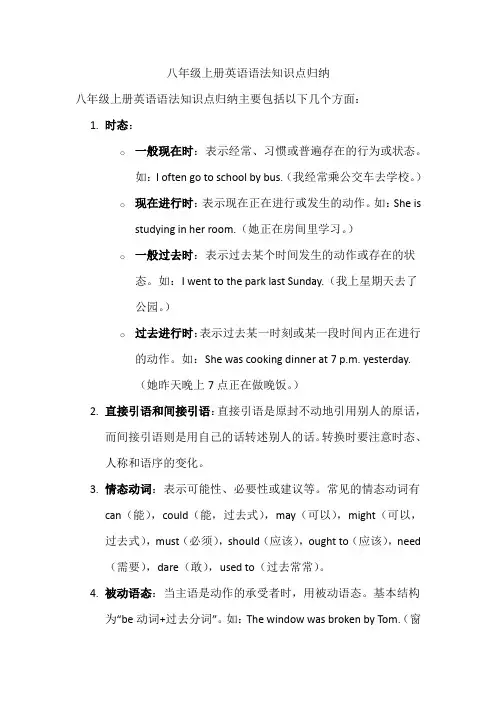
八年级上册英语语法知识点归纳八年级上册英语语法知识点归纳主要包括以下几个方面:1.时态:o一般现在时:表示经常、习惯或普遍存在的行为或状态。
如:I often go to school by bus.(我经常乘公交车去学校。
)o现在进行时:表示现在正在进行或发生的动作。
如:She is studying in her room.(她正在房间里学习。
)o一般过去时:表示过去某个时间发生的动作或存在的状态。
如:I went to the park last Sunday.(我上星期天去了公园。
)o过去进行时:表示过去某一时刻或某一段时间内正在进行的动作。
如:She was cooking dinner at 7 p.m. yesterday.(她昨天晚上7点正在做晚饭。
)2.直接引语和间接引语:直接引语是原封不动地引用别人的原话,而间接引语则是用自己的话转述别人的话。
转换时要注意时态、人称和语序的变化。
3.情态动词:表示可能性、必要性或建议等。
常见的情态动词有can(能),could(能,过去式),may(可以),might(可以,过去式),must(必须),should(应该),ought to(应该),need(需要),dare(敢),used to(过去常常)。
4.被动语态:当主语是动作的承受者时,用被动语态。
基本结构为“be动词+过去分词”。
如:The window was broken by Tom.(窗户是汤姆打破的。
)5.定语从句:修饰名词或代词的从句称为定语从句,通常放在所修饰的词之后。
如:The boy who is wearing a red shirt is mybrother.(穿红色衬衫的男孩是我哥哥。
)6.反身代词:表示反射或强调的代词,如:myself(我自己),yourself(你自己),himself(他自己),herself(她自己),themselves(他们自己),ourselves(我们自己)。
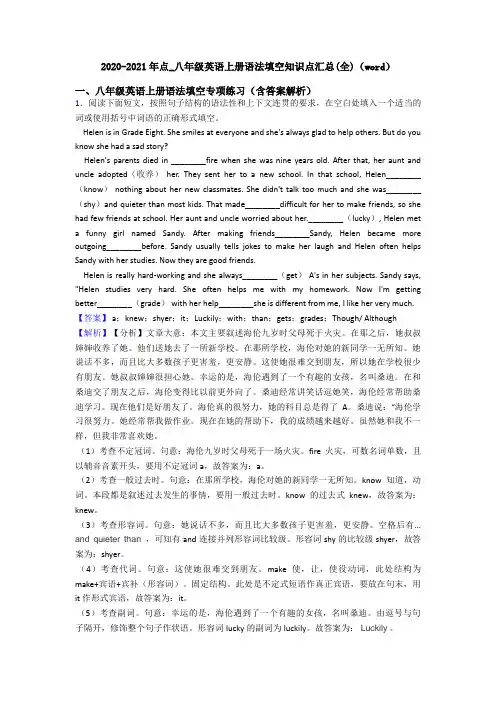
2020-2021年点_八年级英语上册语法填空知识点汇总(全)(word)一、八年级英语上册语法填空专项练习(含答案解析)1.阅读下面短文,按照句子结构的语法性和上下文连贯的要求,在空白处填入一个适当的词或使用括号中词语的正确形式填空。
Helen is in Grade Eight. She smiles at everyone and she's always glad to help others. But do you know she had a sad story?Helen's parents died in ________fire when she was nine years old. After that, her aunt and uncle adopted(收养)her. They sent her to a new school. In that school, Helen________(know)nothing about her new classmates. She didn't talk too much and she was________(shy)and quieter than most kids. That made________difficult for her to make friends, so she had few friends at school. Her aunt and uncle worried about her.________(lucky), Helen met a funny girl named Sandy. After making friends________Sandy, Helen became more outgoing________before. Sandy usually tells jokes to make her laugh and Helen often helps Sandy with her studies. Now they are good friends.Helen is really hard-working and she always________(get) A's in her subjects. Sandy says, "Helen studies very hard. She often helps me with my homework. Now I'm getting better________(grade) with her help________she is different from me, I like her very much.【答案】 a;knew;shyer;it;Luckily;with;than;gets;grades;Though/ Although【解析】【分析】文章大意:本文主要叙述海伦九岁时父母死于火灾。
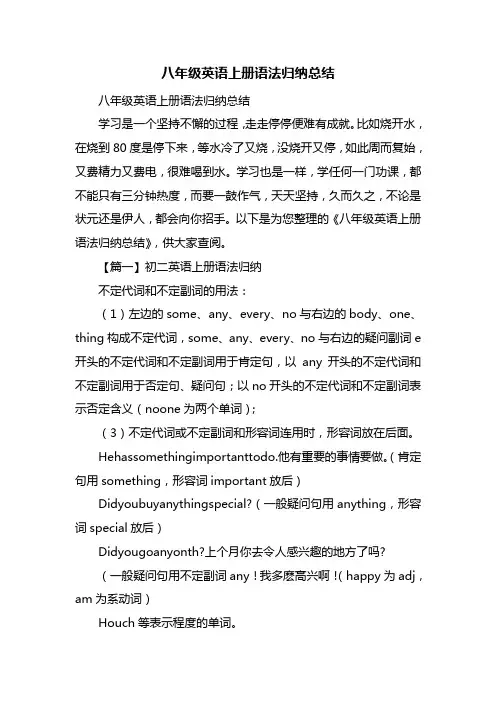
八年级英语上册语法归纳总结八年级英语上册语法归纳总结学习是一个坚持不懈的过程,走走停停便难有成就。
比如烧开水,在烧到80度是停下来,等水冷了又烧,没烧开又停,如此周而复始,又费精力又费电,很难喝到水。
学习也是一样,学任何一门功课,都不能只有三分钟热度,而要一鼓作气,天天坚持,久而久之,不论是状元还是伊人,都会向你招手。
以下是为您整理的《八年级英语上册语法归纳总结》,供大家查阅。
【篇一】初二英语上册语法归纳不定代词和不定副词的用法:(1)左边的some、any、every、no与右边的body、one、thing构成不定代词,some、any、every、no与右边的疑问副词e 开头的不定代词和不定副词用于肯定句,以any开头的不定代词和不定副词用于否定句、疑问句;以no开头的不定代词和不定副词表示否定含义(noone为两个单词);(3)不定代词或不定副词和形容词连用时,形容词放在后面。
Hehassomethingimportanttodo.他有重要的事情要做。
(肯定句用something,形容词important放后)Didyoubuyanythingspecial?(一般疑问句用anything,形容词special放后)Didyougoanyonth?上个月你去令人感兴趣的地方了吗?(一般疑问句用不定副词any!我多麽高兴啊!(happy为adj,am为系动词)Houch等表示程度的单词。
例如:①Ourschoolisbeautiful.一判:beautiful为形容词;二定:beautiful为形容词,用Hoisverybright.②Weliveahappylifetoday.③Itisanicepresent.④Thisisdifficultproblem.⑤Sheplayedthepianoonth在本月底4.gobackto+地点:回到某地Hesb.收到某人的来信=receivealetterfromsb.9.theopeningof:开幕/开业10.在具体哪一天的上午、下午、晚上用on,比较:inthemorning在早晨onSundaymorning在星期天的早晨11.invitesbto+地点:邀请某人去某地(invite--invitation)invitesbtodosth邀请某人做某事12.replytosth/sb:回答某事/回答某人goshopping购物,dohomeorroannextannextweek.Shewontfinishtheworkin2wee ks.。
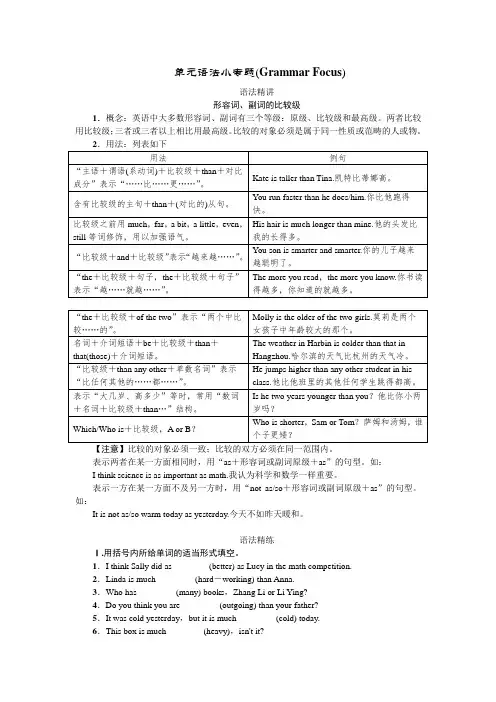
单元语法小专题(Grammar Focus)语法精讲形容词、副词的比较级1.概念:英语中大多数形容词、副词有三个等级:原级、比较级和最高级。
两者比较用比较级;三者或三者以上相比用最高级。
比较的对象必须是属于同一性质或范畴的人或物。
【注意】比较的对象必须一致;比较的双方必须在同一范围内。
表示两者在某一方面相同时,用“as+形容词或副词原级+as”的句型。
如:I think science is as important as math.我认为科学和数学一样重要。
表示一方在某一方面不及另一方时,用“not as/so+形容词或副词原级+as”的句型。
如:It is not as/so warm today as yesterday.今天不如昨天暖和。
语法精练Ⅰ.用括号内所给单词的适当形式填空。
1.I think Sally did as ________(better) as Lucy in the math competition.2.Linda is much ________ (hard-working) than Anna.3.Who has ________ (many) books,Zhang Li or Li Ying?4.Do you think you are ________ (outgoing) than your father?5.It was cold yesterday,but it is much ________ (cold) today.6.This box is much ________(heavy),isn't it?7.Who is ________ (funny) than you in your class?8.I work ________(hard) this term,but David works even ________(hard).9.Which day was ________(hot),today or yesterday?10.This story is very ________(interesting),but that story is ________(interesting) than this one.Ⅱ.按要求完成下列句子,每空一词。
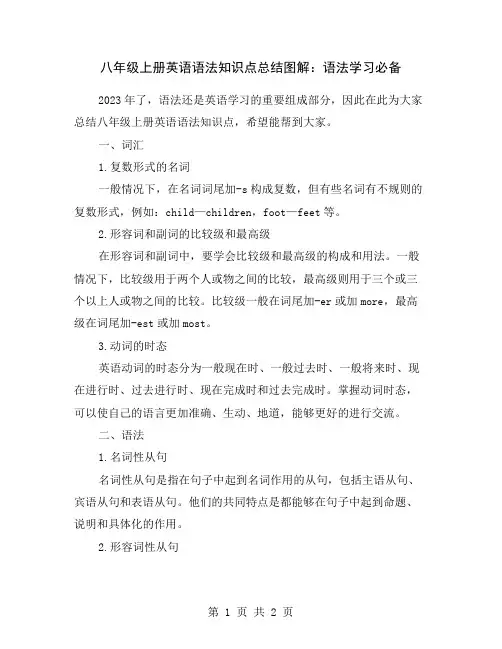
八年级上册英语语法知识点总结图解:语法学习必备2023年了,语法还是英语学习的重要组成部分,因此在此为大家总结八年级上册英语语法知识点,希望能帮到大家。
一、词汇1.复数形式的名词一般情况下,在名词词尾加-s构成复数,但有些名词有不规则的复数形式,例如:child—children,foot—feet等。
2.形容词和副词的比较级和最高级在形容词和副词中,要学会比较级和最高级的构成和用法。
一般情况下,比较级用于两个人或物之间的比较,最高级则用于三个或三个以上人或物之间的比较。
比较级一般在词尾加-er或加more,最高级在词尾加-est或加most。
3.动词的时态英语动词的时态分为一般现在时、一般过去时、一般将来时、现在进行时、过去进行时、现在完成时和过去完成时。
掌握动词时态,可以使自己的语言更加准确、生动、地道,能够更好的进行交流。
二、语法1.名词性从句名词性从句是指在句子中起到名词作用的从句,包括主语从句、宾语从句和表语从句。
他们的共同特点是都能够在句子中起到命题、说明和具体化的作用。
2.形容词性从句形容词性从句是在句子中作定语的从句,又称定语从句。
通常用关系代词或关系副词引导,常见的有who, whom, whose, which, that 等。
3.副词性从句副词性从句是在句子中作状语的从句。
根据它们的连接词不同,可以分为时间状语从句、条件状语从句、原因状语从句和结果状语从句等。
4.虚拟语气虚拟语气是一种与实际情况相反的虚幻形式。
英语中虚拟语气主要体现为虚拟条件句、虚拟语气的要求、虚拟愿望、虚拟建议等方面。
5.间接引语间接引语是指用自己的话转述别人的话。
英语中,引言部分通常由that引导,但对于某些动词和表达特定意义的词语,也可以使用其他引导词。
总之,英语语法知识点虽多,但通过不断地学习和练习,我们可以更好地理解和运用英语,同时也提高自己的口语和写作水平。
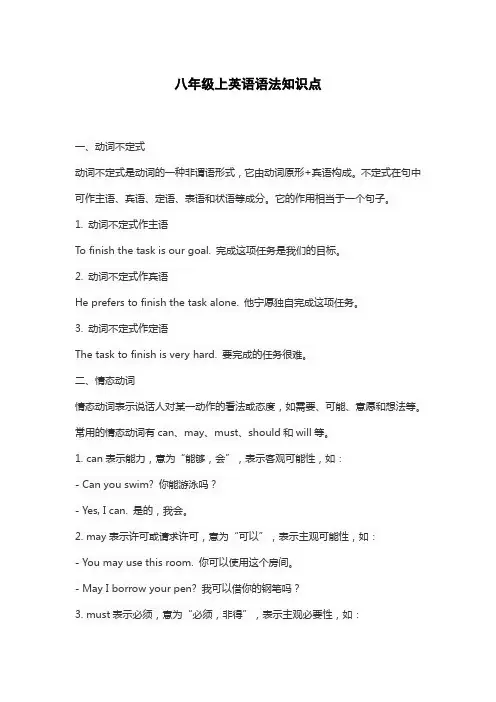
八年级上英语语法知识点一、动词不定式动词不定式是动词的一种非谓语形式,它由动词原形+宾语构成。
不定式在句中可作主语、宾语、定语、表语和状语等成分。
它的作用相当于一个句子。
1. 动词不定式作主语To finish the task is our goal. 完成这项任务是我们的目标。
2. 动词不定式作宾语He prefers to finish the task alone. 他宁愿独自完成这项任务。
3. 动词不定式作定语The task to finish is very hard. 要完成的任务很难。
二、情态动词情态动词表示说话人对某一动作的看法或态度,如需要、可能、意愿和想法等。
常用的情态动词有can、may、must、should和will等。
1. can表示能力,意为“能够,会”,表示客观可能性,如:- Can you swim? 你能游泳吗?- Yes, I can. 是的,我会。
2. may表示许可或请求许可,意为“可以”,表示主观可能性,如:- You may use this room. 你可以使用这个房间。
- May I borrow your pen? 我可以借你的钢笔吗?3. must表示必须,意为“必须,非得”,表示主观必要性,如:- You must finish your homework. 你必须完成你的家庭作业。
- It's raining outside. You must put on your raincoat. 外面下雨了,你必须穿上你的雨衣。
4. should表示应该,意为“应该”,表示道德和责任,如:- You should help others when they are in need. 当别人需要帮助时,你应该帮助他们。
- It's important that you should study hard. 你努力学习是很重要的。
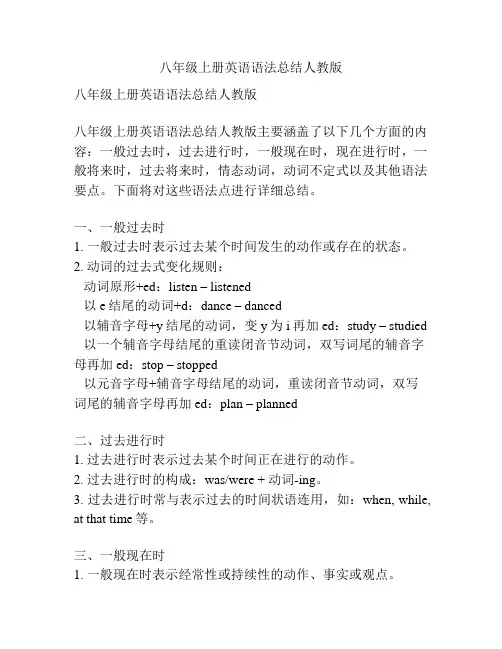
八年级上册英语语法总结人教版八年级上册英语语法总结人教版八年级上册英语语法总结人教版主要涵盖了以下几个方面的内容:一般过去时,过去进行时,一般现在时,现在进行时,一般将来时,过去将来时,情态动词,动词不定式以及其他语法要点。
下面将对这些语法点进行详细总结。
一、一般过去时1. 一般过去时表示过去某个时间发生的动作或存在的状态。
2. 动词的过去式变化规则:动词原形+ed:listen – listened以e结尾的动词+d:dance – danced以辅音字母+y结尾的动词,变y为i再加ed:study – studied 以一个辅音字母结尾的重读闭音节动词,双写词尾的辅音字母再加ed:stop – stopped以元音字母+辅音字母结尾的动词,重读闭音节动词,双写词尾的辅音字母再加ed:plan – planned二、过去进行时1. 过去进行时表示过去某个时间正在进行的动作。
2. 过去进行时的构成:was/were + 动词-ing。
3. 过去进行时常与表示过去的时间状语连用,如:when, while, at that time等。
三、一般现在时1. 一般现在时表示经常性或持续性的动作、事实或观点。
2. 动词的一般现在时:第三人称单数主语,动词原形+s:he reads books.主语为非第三人称单数,动词原形:I eat breakfast every day.四、现在进行时1. 现在进行时表示现在正在进行的动作。
2. 现在进行时的构成:am/is/are + 动词-ing。
五、一般将来时1. 一般将来时表示将来要发生的动作或存在的状态。
2. 一般将来时的构成:will + 动词原形。
3. 肯定句:主语 + will + 动词原形。
否定句:主语 + will not/won't + 动词原形。
疑问句:Will + 主语 + 动词原形?六、过去将来时1. 过去将来时表示在过去某个时间点或过去某个动作之前将要发生的动作。
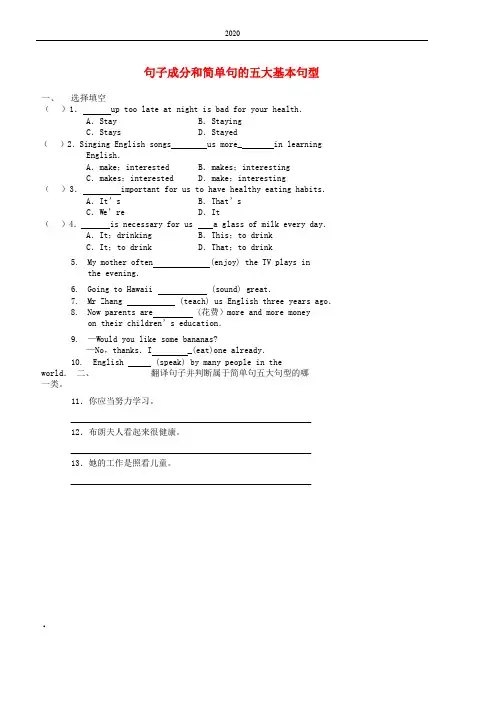
2020·句子成分和简单句的五大基本句型一、选择填空()1.up too late at night is bad for your health.A.Stay B.StayingC.Stays D.Stayed()2.Singing English songs us more_ in learning English.A.make;interested B.makes;interestingC.makes;interested D.make;interesting()3.important for us to have healthy eating habits.A.It’s B.That’sC.W e’r e D.It()4.is necessary for us a glass of milk every day.A.It;drinking B.This;to drinkC.It;to drink D.That;to drink5. My mother often (enjoy) the TV plays inthe evening.6. Going to Hawaii (sound) great.7. Mr Zhang (teach) us English three years ago.8. Now parents are (花费)more and more moneyon their children’s education.9. —Would you like some bananas?—No,thanks.I _(eat)one already.10. English (speak) by many people in the world.二、翻译句子并判断属于简单句五大句型的哪一类。
11.你应当努力学习。
12.布朗夫人看起来很健康。
13.她的工作是照看儿童。
202014.这报告(report)听起来很有意思。
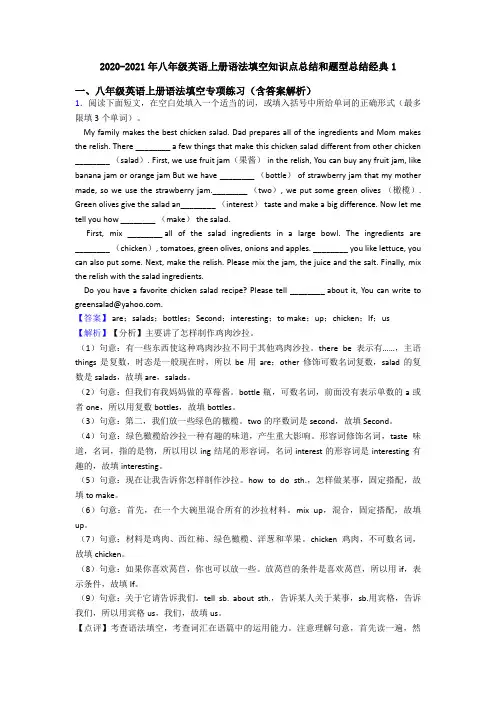
2020-2021年八年级英语上册语法填空知识点总结和题型总结经典1一、八年级英语上册语法填空专项练习(含答案解析)1.阅读下面短文,在空白处填入一个适当的词,或填入括号中所给单词的正确形式(最多限填3个单词)。
My family makes the best chicken salad. Dad prepares all of the ingredients and Mom makes the relish. There ________ a few things that make this chicken salad different from other chicken ________ (salad). First, we use fruit jam(果酱) in the relish, You can buy any fruit jam, like banana jam or orange jam But we have ________ (bottle) of strawberry jam that my mother made, so we use the strawberry jam.________ (two), we put some green olives (橄榄). Green olives give the salad an________ (interest) taste and make a big difference. Now let me tell you how ________ (make) the salad.First, mix ________ all of the salad ingredients in a large bowl. The ingredients are ________ (chicken), tomatoes, green olives, onions and apples. ________ you like lettuce, you can also put some. Next, make the relish. Please mix the jam, the juice and the salt. Finally, mix the relish with the salad ingredients.Do you have a favorite chicken salad recipe? Please tell ________ about it, You can write to greensalad@.【答案】 are;salads;bottles;Second;interesting;to make;up;chicken;If;us【解析】【分析】主要讲了怎样制作鸡肉沙拉。
1 / 10 八年级上英语语法总结 八年级上英语语法总结 1) leave的用法 1.“leave+地点”表示“离开某地”。例如: When did you leave Shanghai?你什么时候离开上海的?
2.“leave for+地点”表示“动身去某地”。例如: Next Friday, Alice is leaving for London.下周五,爱丽斯要去伦敦了。 3.“leave+地点+for+地点”表示“离开某地去某地”。例如:Why are you leaving Shanghai for Bei __g?你为什么要离开上海去北京?
2)情态动词should“应该”学会使用 should作为情态动词用,常常表示无意、惊讶、不能理解等,有“竟会”的意思,例如:
How should I know?我怎么知道? Why should you be so late today?你今天为什么来得这么晚? should有时表示应当做或发生的事,例如:We should help each other.我们应当互相帮助。
我们在使用时要注意以下几点: 1.用于表示“应该”或“不应该”的概念。此时常指长辈教导或责备晚辈。例如:
You should be here with clean hands.你应该把手洗明净了再来。 2.用于提出意见劝导别人。例如: You should go to the doctor if you feel ill.如果你感觉不惬心,你最佳去看医生。3.用于表示可能性。should的这一用法是考试中常常出现的考点之一。例 2 / 10
如: We should arrive by supper time.我们在晚饭前就能到了。 She should be here any moment.她随时都可能来。
3) What...?与Which...? 1.what 与 which 都是疑问代词,都可以指人或事物,但是what仅用来询问职业。如:
What is your father?你父亲是干什么的? 该句相当于: What does your father do? What is your father“s job? Which 指代的是特定范围内的某一个人。如:---Whichis Peter?哪个是皮特?
---The boy behind Mary.玛丽背后的那个男孩。2.What...?是泛指,所指的事物没有范围的限制;而Which...?是特指,所指的事物有范围的限制。如: What color do you like best?(所有颜色)你最喜爱什么颜色?
Which color do you like best, blue, green or yellow?(有特定的范围)你最喜爱哪一种颜色?
3. what与 which 后都可以接单、复数名词和不可数名词。如:Which pictures are from China?哪些图片中国?
4)频度副词的位置 1.多见的频度副词有以下这些:always(总是,一直)usually(通常)often(常常,经常)sometimes(有时候)never(从不)
2.频度副词的位置: a.放在连系动词、助动词或情态动词后面。如: David is often arrives late for school.大卫上学经常迟到。b.放在行为动词前。 3 / 10
如:We usually go to school at 7:10 every day.我们每天经常在7:10去上学。c.有些频度副词可放在句首或句尾,用来表示强调。如:Sometimes I walk home, sometime I rides a bike.有时我步行回家,有时我骑自行车。
3.never放在句首时,主语、谓语动词要倒装。如:Never have I been there. 5) every day 与 everyday 1. every day 作状语,译为“每一天”。如:We go to school at 7:10 every day.我们每天7:10去上学。
I decide to read English every day.我决定每天读英语。 2. everyday作定语,译为“日常的”。 She watches everyday English on TV after dinner.她晚饭后在电视上看日常英语。
What“s your everyday activity?你的日常活动是什么?6) forget doing/to do与remember doing/to do
1.forget to do忘记要去做某事。(未做) forget doing 忘记做过某事。(已做) The light in the office is still on. He forgot to turn it off.办公室的灯还在亮着,它忘记关了。(没有做关灯的动作) Heforgot turning the light off.他忘记他已经关了灯了。(已做过关灯的动作)
Don“t forget to e tomorrow.别忘了明天来。(to e动作未做)典型例题 ---- The light in the office is still on. ---- Oh,I forgot___. A.turning it off B.turn it off C.to turn it off D.having turned it off 答案:C。由the light is still on 可知灯亮着,即关灯的动作没有发生,因此用forget to do sth.而forget doing sth 表示灯已经关上了,而自己忘记了这一事实。此处不符合题意。2.remember to do记得去做某事(未做) 4 / 10
remember doing 记得做过某事(已做) Remember to go to the post office after school.记着放学后去趟邮局。 Don“t you remember seeing the man before?你不记得以前见过那个人吗? 7)如何表达英语中的“穿、戴”?英语中表示“穿、戴”的表达方法有好几种,多见的有以下这些:
1、put on 主要表达“穿”的动作。如:He put on his coat.他穿上了他的外套。
You“d better put on your shoes.你最佳穿上你的鞋子。 2、wear 主要表示“穿、戴”的状态。如:The old man wears a pair of glasses.老人戴着一副眼镜。
The girl is wearing a red skirt.那女孩穿着一条红色的短裙。3、dress 可作及物动词,有“给......穿衣”的意思,后接“人”,而不是“衣服”。如:Please dress the children right now.请立即给孩子们穿上衣服。
dress 也可作不及物动词,表示衣着的习惯。如:The woman always dresses in green.那位妇女总是穿绿色的衣服。
4、be in 表示穿着的状态。如:John is in white today.约翰今天穿白色的衣服。
The man in black is a football coach. 10) a little, a few与a bit (of) a little, a few 与a bit (of)都有“一些、少量”的意义。 他们的区别在哪里呢? 1.a little 意为“一些、少量”,后接不可数名词。如: There is a little water in the bottle.瓶子里有一点水。 5 / 10
还可以接形容词。如:He is a little shy.他有些害臊。2.a few 意为“一些、少数”,后接复数的可数名词。如: There are a few people in the room.房间里有一些人。
3.a bit 意为“一点儿”,后接形容词。如: It“s a bit cold.有点冷。 a bit of 后接不可数名词。如:He has a bit of money.他有一点儿钱。 4. a little表肯定意义,little 表否定意义;a few 表肯定意义,few 表否定意义。如: There is a little soda in the glass.杯子里有一点儿汽水。
There is little soda in the glass.杯子里几乎没有汽水了。 I have a few Chinese friends.我有一些中国朋友。 Few people like him.几乎没有人喜欢他。 5. a little = a bit of,后接不可数名词; a little = a bit = a little bit = kind of,后接形容词,意为“有点儿”。 8) stop to do sth与 stop doing sth 1.stop to do sth 意为“停下来去做某事”。如: The students stop to listen to their teacher.学生们停下来去听他们老师讲话。
2. stop doing sth意为“停止做某事”。如: The students stopped talking.学生们停止了谈话。
与它们相反的句式是:go on to do sth “继续做某事(与刚才一事例外)”和 go on doing sth “继续做某事(与刚才同一件事)”。
如: He finishes his homework and goes on to study English他完成了作业,接着继续去念英语。
They went on playing games.他们继续玩游戏。